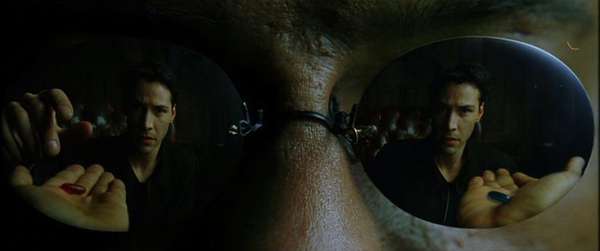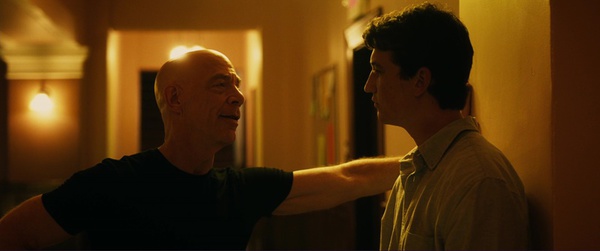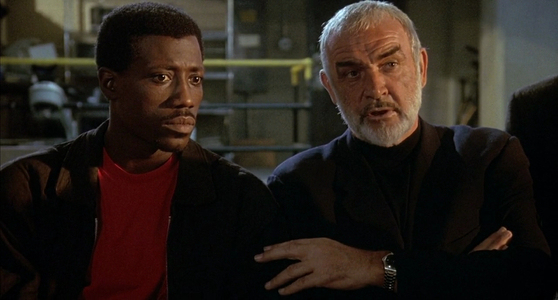On Wednesday, April 26, I gave a talk at Webit 2017 in Sofia about mentoring and movies. The audio unfortunately came out like it was recorded through two tin cans connected by rusty barbed wire. I write these things as effectively a long speech, so my original notes should work as a transcript.
Update: Here’s the video from CodeMotion Berlin 2017.
Introduction
Hi, I’m Ricardo Méndez. If you want to get in touch, that’s my e-mail, and my Twitter handle will be right there at the bottom.
Update: I’m no longer on Twitter, but you can find me on BlueSky.
Before we launch into this whole thing, help me out here. Show of hands…
- Who here has a mentor?
- Who here is currently mentoring or has mentored someone?
We’re going to be talking about mentoring, so let me first give you some background, so that you know where I’m coming from.
I’ve been doing software development for over 20 years, and I’ve been around, from writing low-level code to running teams to starting companies, and have had the opportunity to mentor people here and there.
Funny enough, I didn’t think for decades about a crucial aspect: what’s in it for you as a mentor.
For me, it was a good way to meet people, since I may want to work with them in the future. It also let me pay forward the help that other people had given me.
It wasn’t until recently that it dawned on me there’s a lot you can learn while mentoring someone. All this time, I’ve been learning from my mentees without consciously realizing it.
So I’ll talk about mentoring, I’ll talk about how it’s not teaching, and I’ll give you a few tips that I’ve picked up myself on the whole process.
And hopefully, I’ll also be able to sell you on the idea that there’s a lot you can gain while you are helping others.
Movies
But first, let’s talk about movies.
I am a movie nerd.
I don’t mean I watch a lot of Netflix.
I mean I’m crazy about movies. I go on filmography binges. I travel to film festivals. I’m that friend who gets snotty about why Scarlet Johansson as Motoko Kusanagi is an abomination, but can also defend the American version of The Ring as a better movie than the Japanese original.
So of course when I started putting together my notes for this talk, I turned to movies.
I figured I could find some good mentoring examples in there, as a visual aid. Drive the point home, if you will. I mean, I remember a lot of movies with mentors in them, from way back when, so how hard could it be?
Until I realized that most movie mentors suck.
Or actually, most portrayals of movie mentors are fairly bad. Even when the mentor is a cool character.
Then I kind of ended up turning the talk into that.
So let’s see… Some of these references will be a bit old, but work with me here.
Let’s do a show of hands again. I’m going to go through a few images, please raise your hands if you’ve seen the movie.
Easy mode first.

Star Wars

The Matrix

Highlander

Whiplash

Almost Famous
Good portrayal, bad portrayal
Why Movies?
Media informs identity. Our brain likes reference points. Whether we like it or not, if we don’t have enough examples of something around us, our brain will go and fetch one from a book or movie or story.
So let’s talk about the portrayals of mentors, and use them for contrasts and examples.
Ta Da! - They just show up
Now, this is my first quibble.
Movie mentors do this thing where they just… show up.

Like on Highlander. One moment MacLeod is looking around, no clue whatsoever, almost getting beheaded by the Kurgan, and the next Sean Connery materializes besides them, completely out of nowhere, looking all flamboyant,

and says “It looksh like you could ushe shome mentoring”.
There’s even that much disputed and recycled line of “When the Pupil is ready, the Master will appear.”
I used to like the sound of that, but when thinking about it more, it implies a certain “worthiness”. Like a mentor should lie hidden, in the shadows, waiting for a pupil to do enough work that they’re worthy of his time.
And even if that line were true.. it also indicates that this “Master” should be on the lookout for pupils. There’s our first take-away: you have to be open to mentor others.
Look around your community. There’s people who might need and be ready for a mentor. They just don’t know who to ask, or how to ask.
There’s our first take-away: you have to be open to mentor others. There’s people out there who could benefit from your experience, and I am sure you could learn something from them as well.
When the Mentor is ready, the Mentees will appear.
Confidence
Which of course brings us to the next thing: are you ready for mentoring people?
Mentors have this self-assured aura. They’ve been around. They know what they’re doing. They can help you. They just seem to exude confidence.
I mean, look at that guy.

He clearly does not care what anyone thinks of him.
What’s more likely is that the first time someone asks you to mentor them, imposter syndrome is going to bite down. Hard.
It bit me, at least. Not only the first few times either. Every time someone comes to me for mentoring on a topic I haven’t mentored before, it pops up again.
Funny thing is, I was happy providing advise to people when I could, but hesitated when asked to become a mentor. What if they ask me about something I have no idea about? What if I screw it up?
Advise is easy. Someone asks you a question, and you don’t know the answer, you just shrug and then you both move on. Advice is a thing of the moment.
Mentoring is harder. When you agreed to mentor someone, you agree to being available. And that might seem like a lot of responsibility.
They are asking you for a reason. You might not think you’re all that, you might even feel like you’re cheating if you are not working on the same area they are, but trust them if they think you have useful expertise.
That has an easy solution.
Get comfortable saying “I don’t know”. Saying “I’ve never run into that before”.
Don’t make stuff up as you go to sound confident, because you’ll just make things worse.
And in case where you are blessed with an over-abundance of confidence, remember that it’s not about you. Check your ego at the door. You are not here to call the shots, don’t assume your advice will be taken as gospel.
On either case, when faced with a situation, a good start is saying “Let’s think this through”, and then asking questions.
Because as we’ll soon get to, as a mentor your job is not to provide answers.
This has an added benefit for you.
It will get you comfortable with uncertainty, and with admitting that you don’t have all the answers.
There’s this brogrammer cockiness that the software industry wants to brow-beat us into. If you’re not confident about everything, you probably don’t know what you’re doing and you’re not worthy of investment money.
This will help you get good at separating the situations where you can deceive yourself into confidence, from those where you actually do have a clue and can provide some answers.
Mentoring vs. teaching
And speaking of answers…Who here would say Obi-Wan was a good mentor to Luke?

Trick question. I’d actually say he was a teacher.
Sure, potato, potatoe; tomato, tomatoe. But there’s a key difference.
A teacher is there to impart knowledge. Get someone with potential, like Luke, who is completely new to this Jedi thing, and imparting the knowledge necessary to harness the force.

As a mentor, that’s not your job. Hell, chances are your mentees know a lot more about the area that they are working on than you do.
(This is also something we’ll come back to)
So if mentoring is not teaching, what is it?
Mentoring is about providing guidance so that your mentees can figure stuff out for themselves. You want to save them a few dead ends, not point out The One True Path. Which is where asking questions comes in.
If a mentee comes to you with a situation, don’t do the reflex thing of providing an answer right away. That’s very much a software engineer thing to do, where we have the habit of jumping straight to implementing a solution.
That’s teaching.

Morpheus, in The Matrix, is much more of a mentor. He doesn’t give Neo direct answers. He has Neo question reality instead and come up with things on his own.
For example, right after Neo has learned kung fu and they’re fighting for the first time, Morpheus defeats him. Neo is all winded, and says he can’t keep up with Morpheus because he’s too fast. Then Morpheus asks him two key questions that make Neo realize what he can do in The Matrix.
“Do you believe that my being stronger or faster has anything to do with my muscles in this place?”
And as Neo is still there, gasping for air, winded from his fight, he asks him a second question.
“Do you think that’s air you’re breathing now?”
These two questions help Neo get on the path of realizing the possibilities in the Matrix, and get him to go beyond anything Morpheus could have taught him, since Morpheus couldn’t have known what The One could do.
So what you want to do is help your mentees figure out which questions they aren’t asking themselves. That way they can fill in the blanks.
Also, ask open questions: Why do you want to solve this problem? What are you trying to achieve here? What happens if you do nothing about this?
What you’re aiming to do is stimulating the thought process. Remember: you’re not making decisions here.
This has an extra advantage. In time, you’ll find that this discipline of stopping yourself from jumping to a solution leaks into your own thought process. You’ll start applying it to your own situations.
In my own experience, few things have been as useful as the habit of evaluating if I am asking the right questions in the first place.
Be approachable
All of this is fine, but the thing is, you have got to make yourself approachable. You have to volunteer.
You can try to go for the talented asshole route, where you expect people come to you just because of how good you are, but… hey, everyone wants to be Steve Jobs or Elon Musk. Most people aren’t.
Terence Fletcher
In fact, this guy here (the bald guy, on the left)

This guy here is called Fletcher. Who had seen Whiplash?
Fletcher is brilliant. He’s a famed conductor. He can tell when one random trombonist is slightly out of tune. People climb over each other for a spot at Fletcher’s band just because of how much they improve while working with him.
Fletcher is not a teacher, but he’s a commanding leader, and as far as suggesting paths and saving dead ends goes, he’s a better example of a mentor than Obi-Wan.
He drives his band members to achieve more. He has them question if they actually want something. He makes them wonder what made the great truly great.

He’s also a horrible human being, and one of the most un-approachable mentors you’re ever going to see.
Lester Bangs
On the other hand…

Seen Almost Famous?
This also on the left is Lester Bangs. Lester runs a magazine. He has gotten some quality writing from Russell Hammond. When Russell shows up, and it turns out he’s a 15-year-old kid, Lester doesn’t laugh at him. Lester doesn’t ask the kid what the hell could he know. Lester doesn’t bring up he has been programming in C since before Russell was born and this damned kid just does Javascript.
What Lester does is he gives Russell a freelance gig, he gives him a platform to jump from, and he gives him his phone number in case he needs guidance.
You need to be more like Lester.
Back to the portrayals
Lester is, by and large, my favorite example of a mentor here. Not only he’s a knowledgeable but approachable character, he also doesn’t pretend that he knows everything about everything.
But there’s another reason.
Did you spot the common factor among the other examples?
In most cases, they are literal graybeards. I could have thrown Gandalf in there as well, but that’d have felt like cheating.
The idea of the mentor as a wizened old man is so entrenched, that it pretty much kept Sean Connery employed for a couple of decades there.



Don’t make that mistake. Don’t think you need to wait until some imaginary age bracket, or hair color, or beard length, or all of the above. Don’t wait until your title is Senior This or Lead That.
If you see a call for mentors, volunteer. If someone asks, say yes.
You will learn
Then the questions is … why bother?
I said this earlier: there’s a lot you can learn while mentoring.
It helps your articulate your ideas
Having to explain your rationale to someone else forces you to articulate and examine your reasons. It helps you question ideas you may take for granted when you confront them with a situation that’s different from the one where you formulated them in the first place.
We build these bubbles around ourselves once we are in our comfort zone. Having to unpack our thought process, see it through someone else’s eyes, helps puncture the bubble.
Feed off of other people’s learning
I said that your mentees know a lot more about the area that they are working on than you do.
They just don’t know about managing teams, or going into a new market, or whatever they asked you to mentor them about.
By being in contact with them, you get to feed off what they know about their area.
Delegated personal growth
Oliver Thamm mentioned that for him it scratches the same itch as a side project. That’s funny, because it’s something I’d felt myself but never quite articulated. Mentoring acts as delegated personal growth.
This thing that your mentee is working on won’t be your baby, but you do get to influence how it’s raised.
Improvement requires exertion.
The only way to grow is to encounter new situations. You’re not going to do that very often at your 9-5 job. Whomever is authorizing your bank transfers does not want you to continually try new things. New things have a learning curve and you can screw them up. Your employer will want to push you to the comfort of the familiar.
Mentoring is going to be new situations, delivered to you via video conference or bar meeting, weekly. Ready or not.
It’s a nice thing to do
Finally, I’m sure we’ve all been helped in the past. Mentoring others is a way to pay it forward.
In closing
There’s a lot of people looking for mentoring. Be open, be willing, be approachable.
You’ll be better off for it.
Oh, and just one last thing. Ionuț Stan did me the favor of reviewing the first draft for this talk. He mentioned something that I hadn’t thought of, and it’s particularly important for those of us who are more senior.
You need to be brave enough to ask someone to mentor you.
I’ve been at this for a while, and I have to say I lucked out and stumbled upon my first two mentors. Don’t leave it to chance. Don’t let ego, or insecurity, or anything else interfere.
That same thing that lets you recognize “I don’t know everything, I should look for help”, will probably go a long way towards making you approachable.
So there you go. Just reaching out, I learned something myself.
Thank you.